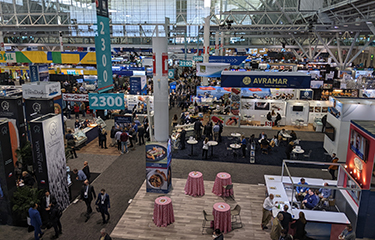Argentina launches squid FIP, Peru announces mahi alliance at SENA

Two new South American fishery improvement projects were announced at the 2022 Seafood Expo North America (SENA) in Boston, Massachusetts, U.S.A.
New FIPs were announced for shortfin squid (Illex argentinus) and the mahi fishery in Peru.
Argentina’s Chamber of Jigger-Fishing Vessel Shipowners (CAPA, per the acronym in Spanish) is working with the Sustainable Fisheries Partnership (SFP) on establishing the Argentina shortfin squid–jig FIP. Under the plan, Argentina's squid fishers are looking to establish a roadmap to sustainability and Marine Stewardship Council (MSC) certification. The plan is also supported by the SFP’s Global Squid Supply Chain Roundtable, an industry group of squid importers and buyers that have helped support the development of the FIP.
“The Argentine shortfin squid is one of the most-important squid fisheries in the world, with product sold globally,” SFP E.U. Markets Director Carmen Gonzalez-Valles said. “This new FIP is an important step forward for the future sustainability of the stock.”
Participants in the FIP are working with a fisheries expert to design a five-year action plan to address weaknesses identified in a recent MSC pre-assessment of the fishery, SFP reported in a release, with the goal set to meet the requirements for active FIPs within one year. The improvement plan “will be a key force for mobilizing other stakeholders in the region,” Gonzalez-Valles said.
“We also hope that markets in the U.S. and E.U. join us in this endeavor by recognizing our efforts,” CAPA President Juan Redini said. "We see this FIP as the only possible way forward.”
The shortfin squid fishery is the world’s second-largest squid fishery, with the species distributed in the southwest Atlantic from Brazil to southern Argentina and the Falkland Islands, and due east to the high seas. In Argentina, CAPA represents the fishing fleet that operates throughout Argentina’s exclusive economic zone (EEZ), the only such fleet in the west that uses jigs for catching shortfin squid. CAPA boasts 32 member-companies, representing 66 jiggers and 90 percent of Argentina's shortfin squid catch.
Separately, the World Wildlife Fund (WWF) has joined forces with Peru’s Trade Commission (Promperú) and SFP to launch the Peru Mahi Alliance (PMA) at SENA. The PMA is a pre-competitive partnership of 13 local mahi processing companies that have come together to drive the implementation of the Peru mahi FIP.
Peru is responsible for a full 50 percent of the world’s mahi catch, representing exports of USD 90 million to USD 100 million (EUR 82 million to EUR 91 million). Of that total, about 70 percent of Peruvian mahi, valued at USD 65 million (EUR 59 million), is exported to the U.S.
Since 2013, with the backing of U.S. buyers, WWF has worked closely with Peru’s fishing industry and the government on an FIP to move the fishery towards MSC certification. The PMA – representing nearly 80 percent of Peru’s mahi exports to the U.S. – was launched in 2019.
"Ensuring the sustainability of the mahi mahi fishery requires the involvement and commitment of all members of the supply chain, including fishers, and seafood companies, as well as the government,” Wendy Goyert, the WWF-US lead specialist, Latin America fisheries in transition, said. The mahi fishery is Peru’s second-largest artisanal fishery involving over 10,000 fishers, and the PMA is expected to help advance the FIP more quickly to achieve the long-term sustainability of the fishery.
Currently there are 13 companies participating in the PMA: Coinrefri, Fisholg, Mai Shi Group, Produpesca, Seafrost, Dexim, Altamarfoods, Spring Valley Seafood, Oceano Corp, Peruvian Seafood, Sercosta, Fernández ,and Produmar.
According to the WWF, the PMA’s accomplishments include:
- Approval of the mahi fishery management regulation, which was developed together with Peru’s Ministry of Production (PRODUCE).
- PMA collaboration with Peru’s Sea Institute (IMARPE) – a specialized technical agency of PRODUCE which advises the state on marine conservation issues – to support biological research by donating mahi samples to the research institute during each fishing season.
- Training workshops with artisanal fishers regarding best practices for the handling and release of sea turtles led by PMA firms, in addition to distributing toolkits to vessels to reduce bycatch of protected species.
- A traceability pilot to digitally record fishery catch data, from the moment of capture through to the destination plant, formed by PMA companies.
Photo by Chris Chase/SeafoodSource






Share